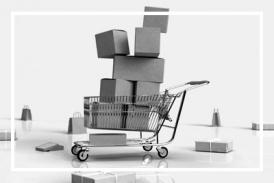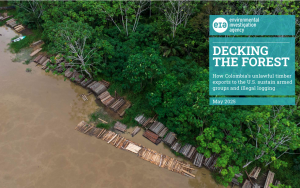Colombia’s Timber Decking Exported with Evidence of Illegality: Some Linked to Conflict, Reaching U.S. and EU Markets
Decking the Forest: How Colombia's unlawful timber exports to the U.S. sustain armed groups and illegal logging
The report, Decking the Forest, reveals how between 2020 and 2023, approximately 94% of Colombia’s wood decking and flooring exports – amounting to approximately US$24 million – appear to have lacked the mandatory certification required to prove legal origin. Many of these exports reached U.S., European and Canadian markets, all with laws that prohibit illegal timber imports.
“The findings of this investigation also lay bare how some Afro-Colombian communities in Colombia’s Pacific region are coerced into logging their forests under abusive arrangements that leave them in debt, with some claiming they suffer conditions akin to slavery. This is a problem driven by timber traders - known as intermediaries - who apparently operate free of scrutiny, profiting from the harvest and laundering of timber at the expense of forest peoples” said Susanne Breitkopf, Deputy Director of the Forest Campaign at EIA US. “Colombia urgently needs legal reform to hold these actors accountable and to ensure they cannot continue exploiting communities and the forests they rely upon.”
Key findings from Decking the Forest include:
- A prominent timber exporter, Los Cedros Hardwood Flooring, that sources timber from the Colombian Pacific, admitted to EIA investigators paying illegal armed groups in Chocó and Antioquia—areas deeply affected by narco-trafficking and conflict—to facilitate its logging business. EIA found that 93% of its exports to the U.S, Canada and the EU, between 2020 and 2023 lacked the required certificate validating their legal origin, according to official information.
- Another top exporter which sources from the Colombian Pacific, Maderas Santa Rita, was found to have none of its required certificates validating the timber’s legal origin, between 2020 and May 2023.
- In the Colombian Amazon, timber linked to the exporter C.I. Casa en Madera was traced to concessions where no logging appears to have occurred, raising concerns of possible timber laundering. EIA also found evidence that the regional environmental authority Corpoamazonia may have falsified supervision reports of those concessions. None of its exports were found to have the required certificates, either.
- 16 U.S firms imported timber without the mandatory certificates including Cedro Rojo, Amazon Hardwoods, Brazilian Lumber, and Sabra International, amongst others.
- The report highlights enforcement failures by Colombian authorities, despite legal requirements under paragraph 1 of article 7 of Resolution 1367 of 2000, from Colombia’s Ministry of Environment, to issue the certificates for export. In parallel, U.S. and EU firms importing these products appear to have failed to conduct proper due care under the Lacey Act or the due diligence required by the European Union Timber Regulation (EUTR) respectively - laws that prohibit the entry of illegal timber.
On March 27, 2025, the U.S.-Colombia Secretariat for Environmental Enforcement Matters, which was established under the U.S.-Colombia Trade Promotion Agreement, determined that: the concerns raised [by EIA] about non-compliance with environmental legislation…, particularly regarding the enforcement of Resolution 1367 of 2000, remain unresolved, as the Party's response [the Colombian government] confirms the potential inadequacy in complying with the issued legal resolution…
EIA urges the proper enforcement of laws in Colombia, the EUTR and the Lacey Act, as well as for the Colombian government to enhance traceability by making timber supply chain data accessible to the public and verifiable, including information on timber harvesting, transports, processing and export of wood products. These steps are essential to prevent illegal timber from entering both national and international markets and to build accountability throughout the supply chain.
Denise Stilley
Environmental Investigation Agency
dstilley|eia-global.org| |dstilley|eia-global.org
Visit us on social media:
LinkedIn
Bluesky
Instagram
Facebook
YouTube
X
Other
Legal Disclaimer:
EIN Presswire provides this news content "as is" without warranty of any kind. We do not accept any responsibility or liability for the accuracy, content, images, videos, licenses, completeness, legality, or reliability of the information contained in this article. If you have any complaints or copyright issues related to this article, kindly contact the author above.
Joseph A. Henseler Steps into the Spotlight with 'Hiding in Plain Site' — A Debut Exhibition Decades in the Making
Sales Training Software Market to Reach $12,232.28 Million by 2034 Globally, at 13.5% CAGR: Allied Market Research
Le nouveau standard audiovisuel VIVID présenté par l’UHD World Association (UWA) au Festival de Cannes
Kalendarium
Więcej ważnych informacji
 Jedynka Newserii
Jedynka Newserii

 Jedynka Newserii
Jedynka Newserii

Konsument

Dzięki e-commerce rośnie eksport polskich małych i średnich przedsiębiorców. Wartość ich sprzedaży na Amazon przekracza rocznie 5 mld zł
Mali i średni przedsiębiorcy coraz lepiej radzą sobie na arenie międzynarodowej, choć na razie tylko niecałe 5 proc. z nich sprzedaje swoje produkty za granicę. Duże możliwości ekspansji zagranicznej dają im e-commerce i współpraca z marketplace’ami. Za pośrednictwem Amazon w 2024 roku polskie MŚP sprzedały produkty za ponad 5,1 mld zł. Model sprzedaży sklepu umożliwia przedsiębiorcom z Polski działanie na skalę, która jeszcze kilka lat temu wydawała się zarezerwowana głównie dla największych marek
Polityka
Większość Polaków sprzeciwia się wprowadzeniu euro. Problemem może być brak dobrej komunikacji

– Polska należy do siedmiu krajów UE, które do tej pory nie wprowadziły jeszcze euro. Choć zobowiązaliśmy się do przyjęcia wspólnej waluty w traktacie akcesyjnym, nigdy nie podjęliśmy konsekwentnych działań w tym kierunku – ocenia europosłanka Nowej Lewicy Joanna Scheuring-Wielgus. W dodatku tylko co czwarty Polak jest zwolennikiem zmiany waluty. Również obecna sytuacja gospodarcza – wysoka inflacja i rosnący deficyt – nie sprzyjają dyskusji o przyjęciu euro.
Handel
Źle wprowadzony system ROP może oznaczać duży wzrost cen dla konsumentów. Podrożeć mogą produkty spożywcze

Ministerstwo Klimatu i Środowiska proponuje powierzenie NFOŚiGW zadań organizacji odpowiedzialności producenta, która w imieniu producentów będzie realizowała obowiązki wynikające z ROP w ramach zamkniętego obiegu finansowego. Przedstawiciele Polskiej Federacji Producentów Żywności i sektora odzysku odpadów ostrzegają, że może utrudnić to Polsce wypełnienie unijnych wymogów w zakresie selektywnej zbiórki odpadów, a co za tym idzie, może się wiązać z karami, a w konsekwencji – ze wzrostem cen.
Partner serwisu
Szkolenia

Akademia Newserii
Akademia Newserii to projekt, w ramach którego najlepsi polscy dziennikarze biznesowi, giełdowi oraz lifestylowi, a także szkoleniowcy z wieloletnim doświadczeniem dzielą się swoją wiedzą nt. pracy z mediami.









.gif)

 |
| |
| |
|